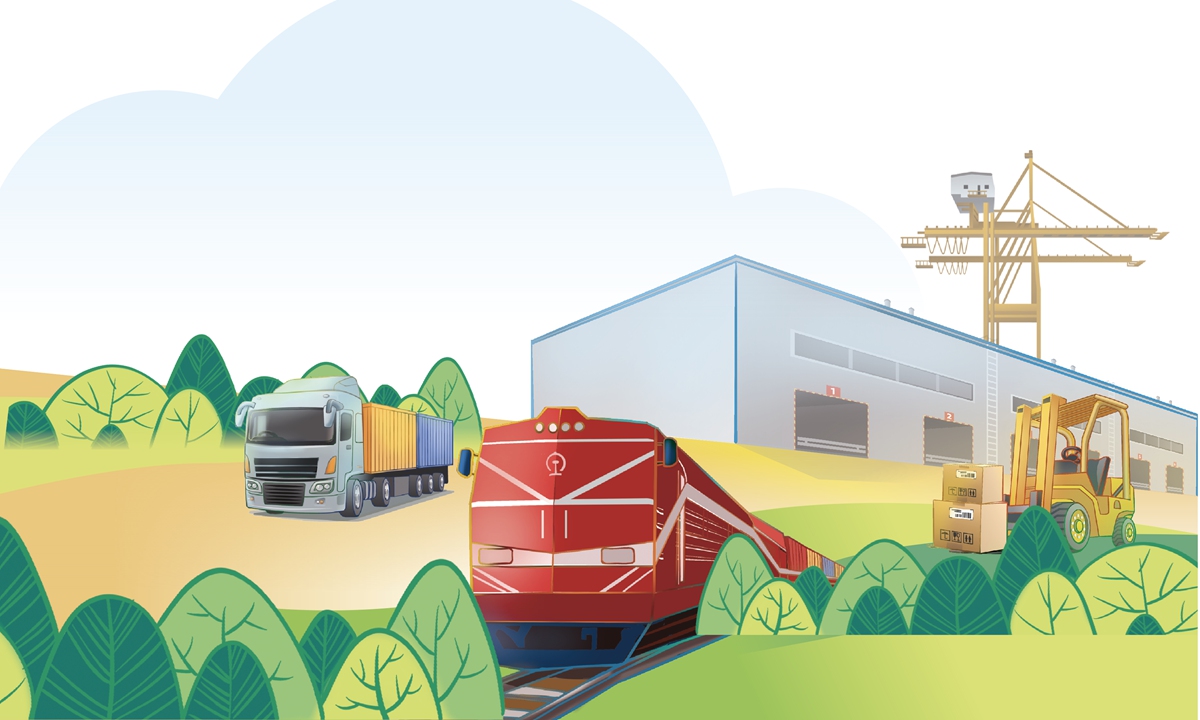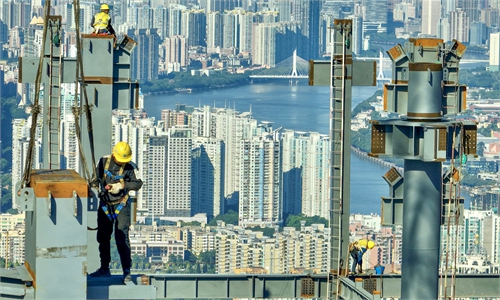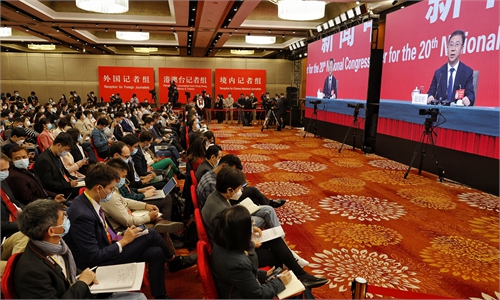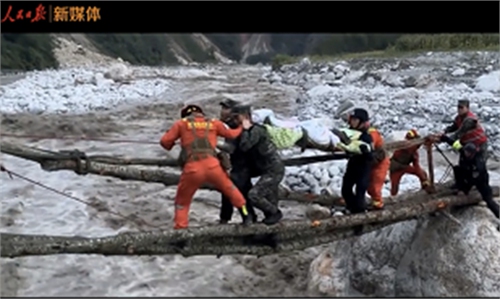
Illustration: Liu Xidan/GT
Editor's Note:China had an epic decade since 2012. Particularly in the last five years, which are truly momentous and extraordinary, the country has successfully dealt with major challenges including turbulent developments in the Hong Kong Special Administrative Region and the COVID-19 epidemic. The 20th National Congress of the Communist Party of China (CPC) will lay out plans for the strategic missions and major measures in the next five years, getting the efforts to build a modern socialist country in all respects off to a good start.
"The incredible thing with China is that the scale and size of the country makes policy development very difficult, but the bureaucracy in China has done a very good job actually of largely navigating some difficult challenges," said John Key (Key), former prime minister of New Zealand. He shared his views on the ongoing 20th National Congress of the CPC in an interview with Global Times (GT) reporter Yu Jincui.
GT: Regarding China's development, what has impressed you the most over the past 10 years? How do you view the role that the CPC has played in the process?
Key: I went to China seven times as prime minister, so I had an opportunity to see various parts of the country and understand it a lot better. In the last 10 years, there's been a dramatic improvement in the living standards of hundreds of millions of Chinese people. I think that reflects the fact that China has a very vibrant and robust economy. I think it's had some very sensible policy settings for a long period of time. It's been an important part of the global supply chain.
Really, I think the incredible thing with China is that the scale and size of the country makes policy development very difficult, but the bureaucracy in China has done a very good job actually of largely navigating some difficult challenges. There are obviously some challenges. But overall, you'd say in the last 10 to 20 years, China's done a good job of lifting a huge part of its population out of the poverty.
Obviously, the CPC has played a critical role in the process because of the power that the ruling party has and the influence it has over the selection of everything from people to the policies they implement to the spending programs that they support. The scale of the development and the requirements on the system are tough. But I think over the last 10 to 20 years, it's been impressive what they've managed to achieve.
GT: The CPC has gained great support from the Chinese people while in contrast, partisan struggle in the West often leads the approval ratings of many ruling parties to be at a record low. How do you see the differences in governance philosophy between China and the West?
Key: I think the West has, not universally but largely, accepted democracy is the system for ruling the country and is the most successful way of making sure that the people control mechanism, if you like, on politicians and on government. Obviously it's not solely the case, but there's been largely the case.
I think every system has its frustrations. On the one hand, the fact that people can exercise the right to choose the government and to get rid of a government they don't like and to support policies that they think are right, has a huge number of benefits. And for the most part, I'm a great believer in democracy. On the other hand, I think when you have a country that's emerging, if you contrast China's rule by the CPC with India's democracy. You can see the challenges the democracy has in a very large populated country. It's been a lot easier for China to make some difficult decisions, but important ones, particularly around the building infrastructure and the planning of the growth of cities and those kinds of things. The systems worked really well for China.
The thing I would still say is that the impressive thing about the Chinese leadership is they are very responsible to the people. Particularly with Xi Jinping and Li Keqiang as president and premier, they have been very active, very visible, very focused on challenges. And if there've been disasters of any sort, they've been very responsible. I think that they've been very conscious of the fact they can only really govern by the support of the people.

John Key Photo: Courtesy of Key
GT: The 20th National Congress of the CPC will focus on the deployment of strategic tasks and major initiatives for the next five years. How do you see the significance of the 20th CPC National Congress?Key: Firstly, I think the CPC National Congress is a very important congress for the Party at this time, because China's taken a different approach to COVID from probably the rest of the world. And I think it's made the decision based on the scale of the population, the fact there are still a lot of people unvaccinated and the pressure that widespread COVID would put on the health system, so they've had to follow a [dynamic] zero COVID policy. And I think that's had economic implications for China. I think you have had also some challenges in your property sector.
The congress happens at a time when there will be great optimism about what China can achieve over the next decade. But equally, the leadership will be focused on those challenges. They would probably focus on the fact that there's a lot of work to do.
GT: All countries in the world face a series of uncertainties and challenges in the next five years. What does China's stability and certainty as a major power mean for the world?
Key: You could go back to 2008 when the global financial crisis happened. China was really and certainly a store, if you like, that kept the global economy going. The United States had a lot of challenges, particularly in its banking system. Europe was quite weakened by the global financial crisis. It was really China's domestic economy, the strength of that economy and the strength of the balance sheet at a government level that supported the world through the global financial crisis. So there's not a question when you've got an economy the size of China's, the intersection of China's economy and the rest of the global supply chain, how important China will be over the next five years.
I think one of the challenges over the last few years since Donald Trump was in office has been that there's been a changing of the narrative from the West toward China, a more negative focus from a lot of politicians and a lot of commentators. So I think one of the challenges for everyone on both sides in the next five years will be how to rebuild a better working relationship on both sides. China really does need the West as a strong trading partner and the West also needs China. They need to cooperate peacefully and in a productive way. There's no question China is emerging as a superpower and will be a superpower alongside the United States. They are both critical players and we need both of them to be successful.
GT: Compared with Western political parties, one of the major features and strengths of the CPC is its self-reform. How do you understand the CPC's self-reform?
Key: I think the very strong focus of the Party, particularly under Xi Jinping's leadership, has been about the lifting of people out of poverty, about economic growth and development, and particularly focused on low-income Chinese people. So they've had a very strong focus on how they improved the financial well-being and therefore opportunities of the least well-off in China.
One of the things that China has concerns about when it looks at the West is the growing inequality it sees and the social unrest born with it. So they've been very focused on that. They've also been very focused on what is required to allow a growth to take place. And it's very difficult. To do that you should have the infrastructure to support it. The Belt and Road Initiative has been quite an important initiative for the Party, partly because it links China with Europe, but partly because their infrastructure is critically important to allow non-inflationary, highly productive growth to take place.
Equally, they've been very focused on the education system. I think they realize that the more highly skilled the population is, the higher wages that can be commanded. To be blunt in the last three or four years, they've been least focused on being a big exporting nation. There's more of the view that the domestic economy is so large that actually they can do pretty well just selling things more internally. But nevertheless, China is an important part of the global supply chain. It is a very important market for many international corporations and for many companies.
This is the first part of the GT interview with the Right Honorable Sir John Key. The second part focusing on China-New Zealand relations will be published soon.



